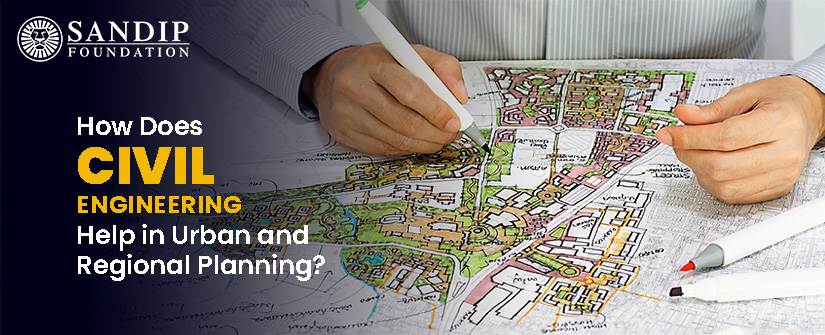Civil engineers are extremely involved in the process of urban and regional planning. Civil engineers design cities which include infrastructure, healthcare facilities, housing, schools, parks, waste management systems, water distribution systems, transportation services and much more. These facilities are very necessary in maintaining a healthy and wholesome environment where people can thrive and lead a meaningful life.
There are many civil engineering courses after 12th that can help you build a career in urban and regional planning if you are interested. Let us understand that urban and regional planning is, and the role civil engineers play in urban and regional planning.
What is Urban and Regional Planning?
Urban and regional planning is a technical process that utilises a particular space to make it habitable for human life. It includes various physical, sociological, and economical parameters to create a space where people can live and enjoy a decent standard of living.
Urban and regional planning is important to ensure that a country develops at a decent pace and can keep up with the social, economic, and technological advancements happening globally. Civil engineers are the professionals who use their skills and knowledge to make this a living reality.
Role of Civil Engineering in Urban and Regional Planning
1. Development of Infrastructure
Infrastructure includes roadways, residential and commercial buildings, bridges, dams, parks and much more. Civil engineering makes all this possible through construction management and an understanding of construction development.
Infrastructure is very important as it ensures a proper standard of living, saves time in travel, and ensures overall public safety. Civil engineers have to take into consideration adverse climatic conditions to ensure that a region’s infrastructure is designed to withstand adverse conditions like floods, earthquakes and other natural disasters.
2. Designing and Maintaining Waste Disposal Systems
Waste management is another important aspect of urban planning that civil engineers oversee. They create systems and processes where waste is collected and disposed of in a safe and timely manner. Sanitation is another aspect of waste management that is integral to urban planning.
Proper and clean sewers, and a functioning sanitation system plays a major role in the overall public health and safety. In the absence of proper civil engineering, there is a possibility that an urban area would be riddled with health issues due to improper waste management and sanitation systems.
3. Developing and Upgrading Transportation Systems
Transportation is another hallmark of a functioning urban region. People living in urban areas need proper transportation facilities to ensure that people can travel from one place to another safely and in a timely manner. Civil engineers plan and create roadways, railways, airways, sea ports, and so much more.
These professionals involved in the government sector also plan things like bus routes, train stations, and other transportation facilities that can help the common man travel without spending vast sums of money. A decent transportation system in an urban area can bring in vast investment in terms of offices and industrial complexes being set up, providing people with jobs and opportunities for a better life.
4. Ensuring Environmental Sustainability
Civil engineers ensure environmental sustainability by implementing things like green energy, renewable energy, energy-saving equipment, and proper green infrastructure to help protect the environment. They ensure that the structures proposed by them have minimal environmental impact in the long run and create better living conditions for future generations.
A Diploma in Civil Engineering after class 10 can help you chart out a career in this field if you are interested in protecting the environment. The role of civil engineers cannot be denied in the safeguarding of the environment in the long run. With the right training and skills, you can become a promising environmental engineer in the future.
5. Structural Engineering for Proper Urbanisation
Urban cities are a part and parcel of a nation’s development. Civil engineers execute regional planning through their knowledge and skills in the field. Old and outdated infrastructure needs to be upgraded to ensure that transportation systems, water dispersing systems, and sanitation structures function smoothly.
Civil engineers improve the overall habitability and appeal of urban areas to ensure a better quality of life for people living in the area. Highly structured and well-functioning cities also attract investment in terms of economic growth and attract the best talent to said areas which boosts its value in the long run.
Conclusion
Civil engineering is the backbone of urban and regional planning. If you are serious about pursuing a career in this field you can find civil engineering course details from the colleges you shortlist. Make sure to do the necessary research when shortlisting colleges. The faculty and infrastructure of the engineering college will go a long way in making you a competent civil engineer. So make sure to pick the right college for a bright career in this field. Good luck!

